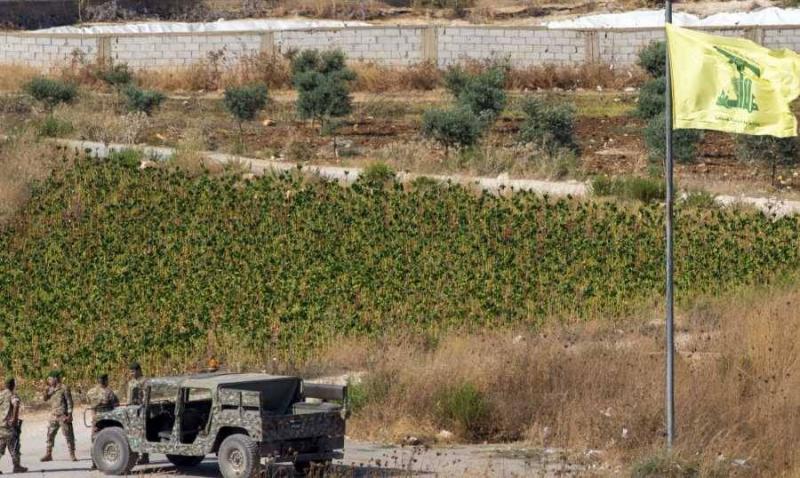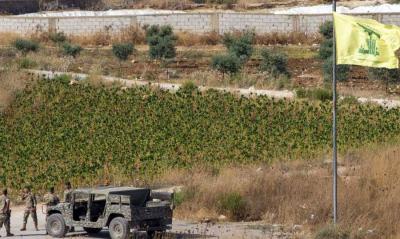It was not ordinary for the Deputy Secretary-General of "Hezbollah," Sheikh Naeem Qassem, to reveal some insights into the "box of secrets" regarding what high-level Western envoys carry in their diplomatic bags during their visits to Lebanon. Since October 8, the southern front has been ignited with confrontations, which have only added fuel to the fires of its multifaceted political and financial crises, placing it on the edge of Gaza, where the ground trembles beneath its inhabitants who are struggling in their own blood while the sector turns into ruins.
American media reports confirm that Israel was close to opening a front with Hezbollah and launching a preemptive strike just four days after the Al-Aqsa Flood, before being deterred by President Joe Biden's administration. Tel Aviv is unwilling to accept the current status of Hezbollah in southern Litani and is trying to exert all forms of pressure to change this reality under the pretext of resolution 1701—whether before or after the Gaza war. Qassem chose to align with the Israeli-international mobilization climate by intentionally revealing discussions from closed rooms and presenting a "triangle of questions" posed to the party, which approaches them with a strategy of constructive ambiguity regarding the hidden answer.
The second-in-command of "Hezbollah" stated that "the delegations sent from Western countries at the highest levels ask us three questions. The first: Will you expand the war or not? The second: What will happen to the settlers, and can they safely return to northern Palestine? The third: Will the resistance remain active in the south and directly on the borders, or will there be certain solutions?" He added that these questions are all aimed at stability in the region.
He said: "We answered them secretly and publicly, stop the aggression on Gaza before any question. The war in the south is a reflection of the aggression on Gaza, and its continuation is linked to the ongoing assault on Gaza. Escalation of the war in the south is related to Israel's actions; if it expands its aggression, we will respond double. We cannot submit; Israeli, American, or international threats have no effect on us." He continued: "We are not discussing with anyone what the situation could be after Israel's war on Gaza; stop the war, and you will get appropriate answers in due time. We will not accept Lebanon to remain under threat and intimidation, and no one has the authority to give commitments to others that Lebanon will remain subdued and will do nothing."
According to knowledgeable circles, Qassem's "cryptic" statements translate, in part, the prevailing conviction among several circles that Hezbollah is not cornered in the field, according to the current military dynamics, and there is nothing compelling it to make any concessions to Israel. The responses, particularly to the question of whether the resistance will remain present in the south and directly on the borders, are necessarily contingent on the "package" being worked on by Washington through Amos Hochstein and the French on the basis of reaching an understanding to "resolve the land dispute," including finding a formula for the occupied Shebaa Farms (potentially placing it under UN control) in exchange for arrangements based on the full implementation of Security Council Resolution 1701, which includes making the area south of the Litani a demilitarized zone or, at the very least, withdrawing the elite unit of the party (Al-Ridwan) and heavy weapons.
According to the circles, the party has established a linkage between any "talk" about its status and role in the post-Gaza war phase and its conclusion first—amidst indications that Washington is also dealing with realism by distinguishing itself from Israeli attempts to pressure for the implementation of 1701 while the war is raging. Hezbollah will not deviate from the policy that any Israeli withdrawal from occupied Lebanese territory or resolution of contentious points along the Blue Line is "a right for Lebanon with no price attached." This emphasizes the "separation of two tracks":
- The removal of excuses that the party believes Tel Aviv and Washington seek through the land agreement file that Hochstein is particularly working on.
- The fate of its deployment and positioning south of the Litani, which entails strategic calculations that cannot be conceived outside the cold war with Iran and its grand project that seeks to mobilize its military arms in the region, on the edges of the Gaza war, without exposing itself to the risk of falling into the hands of the U.S. fleets spread in the Mediterranean.
While diplomatic corridors in various capitals witness strenuous negotiations to create a political cover to halt the "Gaza massacre" based on achieving a prisoner and detainee exchange agreement and establishing arrangements that guarantee against repeating October 7, 2022—whether through the elimination of "Hamas" or by "dissolving" its capacity, both leadership-wise and logistically, to pose a lethal threat according to Israel’s perspective—the situation in southern Lebanon has not quieted down, but rather has continued to escalate in a manner that is somewhat "limited" geographically.




